Cohen says Hallam was an innocent – young for his age, smaller than her other boys. He was 17 when Kassahun, 21, was killed, and always said he had not been at the scene. He was arrested on a Wednesday, and the next day the mother of one of the boys arrested alongside him turned up at Cohen's door and said Sam hadn't been there. The woman then went to the police with her son to say the same thing, but it made no difference. In October 2005, Hallam, by then 18, was given a life sentence and jailed for a minimum of 12 years.
Cohen, broken and distraught, didn't know what to do. So she did nothing. She stopped going out and started to drink alone. When, in 2007, Hallam lost an appeal, she broke down. "I was screaming the courts down, and the QC Robert Fortune said there was no more he could do." Paul May, who'd campaigned on behalf of the Guildford Four and Birmingham Six, turned up at the court of appeal to support the
family. "Paul said, 'Come to the pub.' I did, and he said, 'This is where we step in.' "
May advised two things: first, scrutinise all the evidence. Part of the problem was that Hallam's alibi was inconsistent. Questioned by the police two weeks after the crime, he got his dates confused when asked what he'd been doing that night. He said he'd been playing football with a friend, who told the police he hadn't. In fact, Hallam had been in the pub with his father, but nobody had remembered.
Second, May said they had to get as much publicity as possible. So they started an official campaigning group and devised any number of media stunts. Cohen points out pictures of people jumping out of a plane and a programme from a play about Hallam's case that was performed at the King's Head in Camden. There are photographs of the day they all went to Birmingham to present their new evidence to the Criminal Cases Review Commission. "I didn't have a clue what the CCRC was before Sam was convicted," Cohen says.
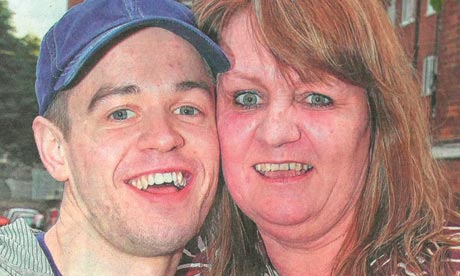 Wendy Cohen with her son Sam Hallam, whose murder conviction was quashed
Wendy Cohen with her son Sam Hallam, whose murder conviction was quashed
The campaign was effective and it seemed inevitable the CCRC would grant a second appeal. Cohen says the turning point came when Thames Valley police reinvestigated the case. In the end, it wasn't hard to clear Sam's name. Of the two witnesses who claimed to have seen him at the scene of the crime, one changed her account several times and eventually told the Old Bailey, "I was just looking for someone on the spot to blame." Another said Hallam was "the only white boy I know from Hoxton, so I said it was Sam". There was no forensic evidence to link Hallam to the scene and he was of previous good character. Ultimately it was his mobile phone, which the police had kept all the time, that provided crucial corroborative evidence – a photograph showed he had been in the pub with his father that evening.
In October 2010, a report in the Independent suggested Hallam was likely to be cleared on appeal. The following day Hallam's father Terry hanged himself. Three years on, Cohen still can't make sense of it. The couple had split a couple of years before Sam was charged, but had remained on good terms. Terry was the optimist, she says. She was the one prone to depression. "Terry had the paper's report in his pocket when he hanged himself." She splutters and bites her lip. "The timing. Just when things looked brilliant. Mad."
Hallam was told of his father's death by the prison chaplain and attended his funeral. "He was breaking his heart and couldn't even wipe his eyes or nose, because he was handcuffed both sides."
Hallam eventually had his conviction quashed on 17 May 2012. After seven years in jail, and aged 24, he still looked like a teenager. "The whole court was screaming and Paul May ran out sobbing," Cohen says. "One of my friends, who's a size eight, lifted me up – and I'm heavy. Sam kept looking up at the ceiling and the judge asked if he understood: 'Does somebody need to explain to Mr Hallam what happened?' Everybody else was crying."
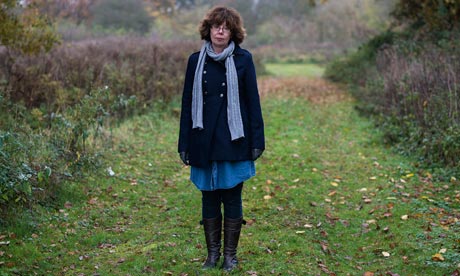 Brigitte Butcher, whose brother, Kevin Nunn, was convicted of murder in November 2006. Photograph: Mimi Mollica for the Guardian
Brigitte Butcher, whose brother, Kevin Nunn, was convicted of murder in November 2006. Photograph: Mimi Mollica for the Guardian
Brigitte Butcher is driving to the scene of the crime. She is at a very different stage of her fight – still trying to convince the world that her brother is not guilty of the shocking murder of which he was convicted. Thirty-nine-year-old Dawn Walker was discovered near the river Lark in Suffolk in February 2005. She was partially naked, her head shaved; she had been immersed in water and left to die of hypothermia, then burned, in an attempt to destroy the evidence, and dumped by the river.
Six weeks later, Butcher's brother, Kevin Nunn, was charged with the murder of his former girlfriend. Butcher still works part-time as a nurse, but much of her time is dedicated to proving Kevin's innocence. Look at the evidence, she says: "It's all circumstantial."
Walker and Nunn had split up on Wednesday 2 February 2005, and Walker had not been seen since. They had been in a relationship for two and a half years. They lived separately but enjoyed holidaying together, walking, working out, cooking. Nunn, a welding salesman, had two sons from his marriage, which had ended in divorce 12 years earlier. He was known as a quiet man, one who would rather walk away from a scene than confront it. Even after he was charged, he was not regarded as a danger to the public. In October 2005 he was granted bail and was able to live on his own and sign in at a police station each day until the trial took place at Ipswich crown court a year later.
The prosecution argued that Nunn had been crazed with jealousy because he believed Walker was going back to a former boyfriend. Nunn has always maintained that their split was amicable and inevitable; that they had separated before, and had talked for some time about how things weren't working out as they hoped.
Walker was found on 4 February and the police conducted door-to-door enquiries the next day. One neighbour said she had seen a silver estate car outside Walker's house at 4.45am on 3 February. Another initially said they had not seen Walker for about two weeks, but later told the police they had heard her rowing with her boyfriend on the night in question and at around 4.50am saw a silver estate car outside her house and two men lugging a heavy item in what looked like a rolled-up carpet into the back of the car.
When Nunn was charged, so was Nigel Hill, a colleague of Walker's who'd previously had a relationship with her and owned a silver estate car. Nunn and Hill said it was true that they had visited the house separately to look for her after she had been reported missing (they didn't know each other). Nunn told the police he and Walker had been keen ramblers and he had retraced their favourite walks in an attempt to find her. One of the places he had visited was close to where her body was eventually found on a footpath near the river. The police then examined the area and, not surprisingly, found footprints from Nunn's boots. This was a vital part of the evidence against him.
Another significant piece of evidence was the fact that Nunn possessed a key to Walker's home. From the outset he had told the police Walker didn't know he had this key – a few months earlier the couple had briefly split up, she had asked for her key back and he had made a copy of it. He told police this was the key he had used to enter her home to search for her after she went missing.
Butcher drives as far as she can on to a field bordering the river before the wheels churn in the mud. It's pouring with rain. We stoop through brambles and netting as close to where Walker was found as we can get – it's a tough, bruising walk, not one you could easily imagine a man making with a body in his arms.
There are two things Butcher can't understand about her brother's trial. First, the case against Hill, who was charged with helping Nunn dispose of the body, was thrown out when high court judge Justice Laura Cox ruled there was insufficient evidence. At this point, Butcher assumed the same ruling would be made about Nunn. It wasn't.
But the strangest thing, she says, is the sperm evidence. Just six weeks before the trial, the prosecution disclosed to the defence that sperm had been discovered on Walker's thigh. Butcher believed that alone would clear her brother's name. "Kevin said to me, 'I don't know if this is relevant, but they've found sperm on her body' and I said, 'That's great. That's our get-out-of-jail card, because you've had a vasectomy. You can produce semen but not sperm.' " He was tested and sure enough no sperm was produced. But at trial the prosecution dismissed the sperm as "tertiary" evidence – in other words, irrelevant. It was argued that Walker had picked up the sperm from a bench in the gym changing rooms at the golf club she and Nunn had attended separately on the evening they split up. (The prosecution claimed Walker had used the men's changing room that night because the women's was being painted, a claim that remains contested today.)
Butcher is incredulous. "This is a respectable golf club and it's an open changing room. I'm sure men don't come in masturbating after their shower with everyone coming and going." She laughs. "It's just not happening, is it? This is where she supposedly sat on the bench with this huge gush of sperm that washed up on her leg. Absurd." The prosecution ruled out the possibility of a sex killing, stating that Nunn had killed her because he was jealous.
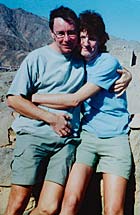 Kevin Nunn with Dawn Walker
Kevin Nunn with Dawn Walker
Has Butcher ever believed her brother is guilty? "No. I just keep thinking they'll realise they've made a huge mistake." Even after he was convicted in November 2006, she was convinced he'd be released on appeal within months. "I'd got no idea that, seven years down the line, we'd still be fighting to get the forensics." Butcher was recently given hope when the supreme court granted a hearing about non-disclosure of evidence in the case, but she knows that's far from a new appeal.
Had Kevin ever been in trouble before? She shakes her head. "He had a speeding ticket, and he once bought a bike he didn't know had been stolen. We came from a council estate, got on and did the best we could. My dad was a lorry driver for 30-40 years and before that a farm worker. My mum was very proud." She looks embarrassed. "She always thought we were better than everybody, and in the end I think we believed it. My sister Donna's got a lovely home in France, Kevin had his house and, although he was divorced, he had two lovely boys."
The family has moved from Bury St Edmunds since Nunn's conviction. Their home village was too small, the crime inescapable. "I know people in other campaigns who are unable to work; they're depressed and can't function. I understand that. Believe me, there have been difficult days, but you've got to fight on, otherwise they've won. They've already taken Kevin's life away."
Butcher is not just a campaigner; she's become something of a detective. She thinks the only way she can prove her brother's innocence is to prove somebody else murdered Walker. She will often spend weekends investigating with her friend Carol, a real detective, asking people if they know anything about the crime. "People slam doors in your face because they think the police have done the right thing or they don't want to get involved."
Butcher clearly remembers the moment Nunn was pronounced guilty. "I ran out into the corridor, throwing everything I had in my hands and screaming. I just looked at my dad and thought, has this really happened?" She gulps. "We'd got our statement all prepared – 'Thank you to the jury for making the right decision.' We were so sure."
Butcher says her family's fight for justice can be lonely. While her sister and their parents have campaigned on Nunn's behalf, his estranged wife was a witness for the prosecution, describing him as a jealous man, and his children have shown no interest in campaigning for him. She knows her quest upsets Walker's family, who believe Nunn is guilty, but says she must continue the search for evidence that will undermine the prosecution's case. She believes she knows who did kill Walker, but of course getting the police or CPS to listen to her version of events is another matter.
How has her life changed? She says she's become cynical. "I don't trust the system any more. If anything went wrong, I don't think I'd be backed up." She also has panic attacks. "I can't go in a lift or toilets without windows. I can't shut the door." She thinks it's worse for her parents. Her father Horace has spent his life savings, £50,000, trying to clear Nunn's name. Butcher says he's recently been in hospital with heart and kidney failure. She begins to cry quietly. "I know there'll be a time when he'll collapse and won't come home, and I'll have to make that call to Kevin."
Back home, she shows the piles of newspaper cuttings and letters and transcripts from the court case. She has become a legal expert since she began campaigning. "A lot of people have said to me, 'Why don't you go and study law?' but all I want is a little bed-and-breakfast. I just want peace and quiet." On a good day, she says, she thinks she might realise her dream.
She and Nunn write to each other all the time. She tells him what is happening in her life, to create a sense of the larger world for him; he will ask for trainers or socks, or draw diagrams of what he thinks actually happened, or tell his sister that he thinks he has discovered a new piece of the jigsaw and ask if she can investigate for him.
The landline rings. It's Nunn. She puts him on speaker phone, and within seconds he is making his case. "I want the real facts to come out. I did not murder Dawn. I had no involvement. I'm innocent; that was a fantasy case that was put into that courtroom. I've only got a few seconds left, sorry. I can phone Friday, that's the best I can do."
"I've sent off the trainers," Butcher tells him. "OK, take care. Love you." She puts the phone down. "God!" she says, drawing a deep breath and trying to hold back her tears. "You have good and bad days. Today it's very difficult. Very difficult."
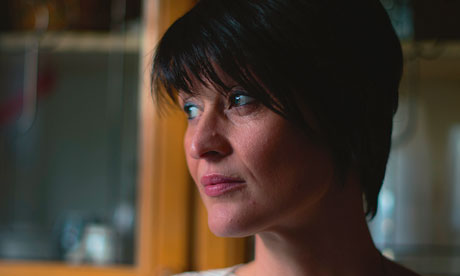 Janet Cunliffe, whose son Jordan was just 15 when he was convicted of murder in 2008. Photograph: Mimi Mollica for the Guardian
Janet Cunliffe, whose son Jordan was just 15 when he was convicted of murder in 2008. Photograph: Mimi Mollica for the Guardian
Janet Cunliffe is at home on a council estate on the outskirts of Warrington, Cheshire. She still gets angry when she thinks back to the trial of her son Jordan, who was 15 when he was convicted of the murder of 47-year-old Garry Newlove.
The attack, outside Newlove's Warrington home, in August 2007, made national headlines. Newlove had gone out to remonstrate with youths he believed were vandalising a neighbour's garden. He died from a single blow to the neck. It was cited as an egregious example of gang culture in lawless Britain. Cunliffe was convicted along with Adam Swellings, 19, and Stephen Sorton, 17. Swellings and Sorton, who aimed the fatal kick, were ordered to serve a minimum of 17 and 15 years respectively; Cunliffe was told he'd serve 12 years. Two other teenagers, including Cunliffe's brother Gareth, were cleared of the killing.
What the papers didn't report was that even the judge accepted Jordan Cunliffe was not involved in the violence – and that he was registered blind. He suffers from keretaconus, a degenerative eye condition. This was to be crucial to the defence and, ultimately, to his conviction. Like Hallam, he was convicted under the joint enterprise law.
His mother says there was a medical specialist set to tell the jury about his blindness: "But the judge said the trial was running behind, and the prosecution and defence agreed the expert's evidence would be read out." Her face flushes when she says the prosecution then treated Jordan as if he was lying when he described his blindness, yet it was obvious to everybody in court that he could not see. Before passing sentence, she says, the judge told Jordan he had no need to stand up because of his sight impairment. "How could he have allowed the prosecution to call Jordan a liar for saying he was blind, then say that?"
Jordan's father left home when both boys were young and has not been in contact since. They were brought up by Janet, whose partner Dom has supported Jordan and the campaign. At school, one teacher described Jordan as "a lovable imp", while a childhood friend said he'd make them laugh till they cried. Throughout primary school, Jordan won achievement awards, then at 10 he began to lose his sight. By 14, he was virtually blind and his work suffered. He took his GCSEs at 15, with the help of a reader and scribe, and passed, though not with the A grades that had once been predicted for him. His optimism began to return when he was told that on his 16th birthday he would go on the list for transplant surgery and his sight could be restored. But he never went out alone. Cunliffe says the only reason Jordan was in Warrington that day was that his brother and a close friend were with him. "It was a rare treat to go out with people who knew and understood his condition."
What could Jordan have seen, say, in this room? "The light, but not your face, from three feet away." Cunliffe takes out a picture she took on his 21st birthday in prison – she is allowed to take photos of him only once a year. "I sometimes think the blindness was a test for what was to come – awful thing for a young boy to lose his sight."
Jordan was a wreck in court: "Crying, couldn't stand up, shaking all over." Gareth, who'd already been acquitted, was sitting beside his mother when Jordan was sentenced. "I grabbed his hand and said, 'Whatever you do, don't show any emotion in front of these people, because they haven't won, I won't let them win.' That has stuck with me for the past five years. I won't let the feeling go."
How does Gareth feel now? "They grew up in the same bedroom, like twins. When Jordan was jailed, Gareth went on a visit and asked prison staff if he could do six years and Jordan six years – do half his brother's time for him."
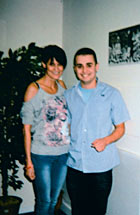 Janet Cunliffe with her son, Jordan
Janet Cunliffe with her son, Jordan
Cunliffe insists she doesn't want Jordan to get out on a technicality. "We want an effective appeal that could help other joint enterprise cases. The most shocking thing for me is that he could go out on a summer's day, play in the park with his brother, meet up with friends [including Swellings and Sorton, whom he knew from school], be on his way home, then come across a situation that he took no part in, and be put through a trial process that did not want to recognise that he was a child, a blind child. That didn't recognise he could not give evidence, could not help the police, because he did not, could not, see what had gone on. The trial actually proved Jordan took no part in the attack, yet he was still found guilty." She takes a breath. "I will never get my head around that – how someone who did not commit murder can be labelled a murderer and go to prison for murder."
Her living room is a jumble of newspaper articles and legal documents. On the wall is a framed certificate of her master's degree in television production. "Nobody wants to know about that," she says. "They are not interested in that bit of me now." The MA, the media career, belong to a different world. Yes, she had a dream job as a production secretary and worked on Coronation Street for a while, but that's the past. These days, she doesn't have time for TV or reading; it's all about the campaign. She makes a circle with her hand. "This – the living room – is my office. There is no other life." She is holding down a part-time job as an assistant editor of a free newspaper, but that is just to put food on the table and ensure she has enough money for the weekly prison visit.
Cunliffe is not simply fighting to have Jordan's conviction quashed, but is campaigning against the joint enterprise law itself. She is not alone in believing her son's case to be a benchmark in
the campaign: the writer
Jimmy McGovern has said he is "wholly innocent" and has been inspired by his case to write a BBC drama about joint enterprise.
Jordan has lost one appeal and his mother is now liaising with lawyers to prepare another. Is she hopeful? "I'm realistic. I know we could be fighting this for another six years, or longer perhaps."
She goes upstairs and returns with a huge, prison-issue plastic bag full of postcards and letters, all sent to Jordan. He gave them to her on the last visit because there was no room in his cell. She pulls them out at random. Here's one from America, and here's another, from Warrington, that reads, "God bless you, Jordan." They are mainly sent by people who have heard about Jordan through the website Cunliffe set up. "On his birthday he got a card from Australia. He rang to say, 'Can't get any farther away than that, can you, Mum?' These cards, letters won't get him out of prison, but he knows he is not forgotten."
Some letters are about football. She says Jordan played until he lost his sight. "Then he couldn't, so he played keepy-uppy." Her face darkens as she recalls how the prosecution used this against him. "They said, 'If you can kick a football, you can kick a man to death.' Jordan didn't kick anyone – and it was never the crown's case that he did."
We're driving to Swinfen Hall, a young offender institution in Staffordshire, 70-odd miles from her home. The rain is battering the windscreen. Like Brigitte Butcher, Cunliffe has moved to a different area since the conviction. She was not living in Warrington at the time Newlove was killed, but has moved there now to "fight it where it happened".
How is her son coping in jail? She says he's better now he has had an operation to restore the sight in one eye. He recently moved to an adult prison, a step along the road to release. On the motorway, she says she used to hate these visits, didn't know what to talk about. Now it's different. "I think we have a much greater bond than most 21-year-olds have with their mum. We try to talk about normal things. Cousins and friends are growing up, getting married, having kids. I like to keep him involved. Other lives continue while his is on hold."
She says Jordan has grown up quickly in prison – he's had to. Their relationship has changed, too. "He used to tell me all the bad stuff that happens in prison, but about two years ago he stopped. Where I protected him, he now protects me."
In his own way, she says, Gareth has suffered just as much as Jordan. He had just turned 15 when Newlove was killed. The boys were on remand for six months in different prisons. She was convinced both would be acquitted. "People think Gareth was lucky to be cleared. No! He is the brother of a convicted murderer, and he spent six months in prison. He missed schooling, his GCSEs." She feels guilty, and says she's neglected him. "If this had not happened, Gareth would be at uni now. I should be pushing him, but I am so absorbed with Jordan's needs, I shove Gareth to one side. He rarely comes into the living room to chat about normal rubbish because he knows it's my office."
Why does she think Gareth was acquitted and Jordan convicted, when both were present at the scene? She has thought about this a lot. "Gareth had visual memory of where he was and what he was doing, and could contradict witnesses who accused him of taking part in the attack. Jordan could not. It was as simple – and wrong – as that."
We arrive at the prison and she finally gets to see Jordan after queueing in the rain outside the visitors' centre. Two hours later she emerges. How did it go? "Good visit. We had a laugh, had a chat about good stuff, just enjoyed each other's company. Only thing he asked is, 'Why is it taking so long?' He always says that."
Back in east London, Wendy Cohen is talking about life after her son's conviction was quashed. To most people, his release was the end of it – justice had been done and the family were free to get on with their lives. If only, Cohen says. On visits, they had put on an act, but not any more. "When he came out, he was shuffling on the spot. He had panic attacks, was biting his lips for days."
For the first time, they each saw how damaged the other was. "When Sam saw me on a visit, I'd be all up – 'Oh, hello!' And when he came home, I was a wreck." Her other children have suffered with depression since their brother was jailed.
Hallam has never talked about his time in prison or about his father's suicide. "None of us are what we were. I used to say, 'It'll all be different when he comes home', and it isn't. It scars you."
There has never been an apology from the Metropolitan police or CPS, though Thames Valley police criticised the Met for failure to pursue reasonable lines of enquiry and non-disclosure.
Does Cohen think Hallam will be able to live normally? "I don't know." She knows he is bottling up his emotions and that it can't be healthy. "All he ever says is sorry. 'Sorry… Sorry… Sorry.'"
Sign the petition to abolish Joint Enterprise law. 





